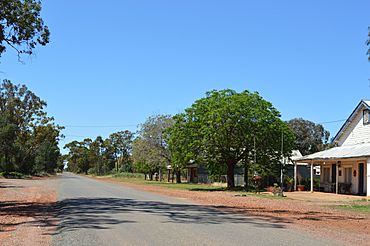Naradhan facts for kids
Quick facts for kids NaradhanNew South Wales |
|
|---|---|

Kikoira Road, the main street of Naradhan
|
|
| Population | 166 (2011 census) |
| Postcode(s) | 2669 |
| Location |
|
| LGA(s) | Bland Shire |
| State electorate(s) | Cootamundra |
| Federal Division(s) | Riverina, Parkes |
Naradhan is a small village and area in the Central West part of New South Wales, Australia. It's about 452 kilometers (281 miles) west of Sydney, which is the capital city of the state. Naradhan is part of the Bland Shire local government area.
The village was officially named in 1930. Today, you can find a shop, a primary school, and a public hall there. There's also an old railway station that isn't used anymore. The name Naradhan comes from a large farm, which was likely named after the Wiradjuri word "ngarradan," meaning "bat."
Contents
Discovering Naradhan
Naradhan is a quiet place with a small community. In 2011, about 166 people lived there. Most of the people were born in Australia, and everyone spoke English as their first language. The average age of people living in Naradhan was 39 years old.
Naradhan Creek and Local Landscape
The village of Naradhan is located right next to Naradhan Creek. This creek starts near Mount Mologone. It flows for about 9.5 kilometers (5.9 miles).
The area around Naradhan is mostly flat. It is used for agriculture, which means farming. However, there are some interesting natural features. In the southern part, you can find several mesas. A mesa is a flat-topped hill with steep sides. There are also two important State forests nearby: Jimberoo State Forest and Conapaira State Forest.
Natural Resources in the Area
Naradhan is known for its natural resources. In the northern part of the area, there are significant deposits of valuable minerals. These minerals include gold, lead, and tin. These are all important metals found in the Earth.
Naradhan's Railway History
A railway line was built to Naradhan, and it officially opened in 1929. This was called the Naradhan railway line. Railways were very important for transporting goods and people in the past.


